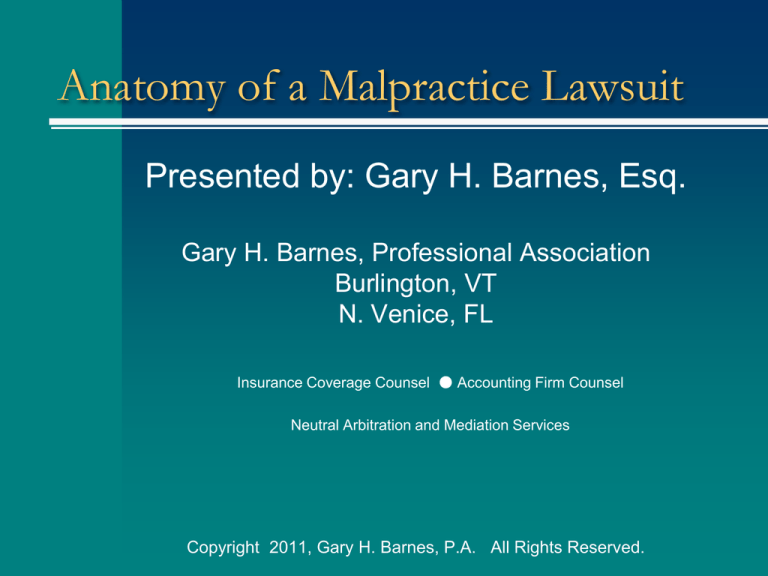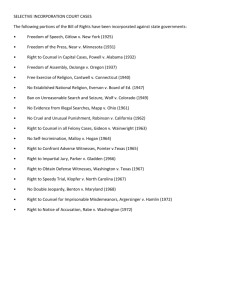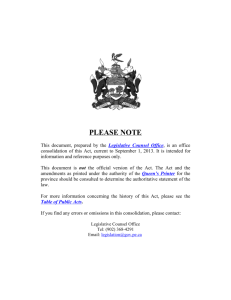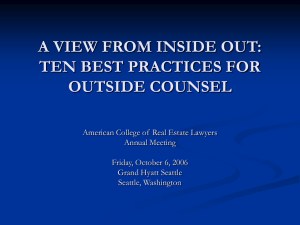
Anatomy of a Malpractice Lawsuit
Presented by: Gary H. Barnes, Esq.
Gary H. Barnes, Professional Association
Burlington, VT
N. Venice, FL
Insurance Coverage Counsel ● Accounting Firm Counsel
Neutral Arbitration and Mediation Services
Copyright 2011, Gary H. Barnes, P.A. All Rights Reserved.
Introduction
What does a lawsuit mean?
– Time
– Money
– Lost Opportunity
– Publicity
– Reputation
– Morale
Introduction (cont.’d)
Most Important, a lawsuit is a process
that determines whether the
government will require wealth-shifting
from the Defendants to the Plaintiff
Introduction: Litigation Outcomes
Worst Outcome
Better Outcome
Best Outcome
Introduction
Who can sue?
Introduction
Who Gets Sued?
The Conventional View vs. Reality
(good accountants and bad
accountants)
Where it all begins
Client Acceptance
Documentation of Expectations
Self-Preservation 101: Put Your Job In
Writing
Self-Preservation 102: Put Your
Clients’ Job In Writing
What To Do When You Discover Your
Own Mistake
The dangers of informing the client
The dangers of investigating – the “self-
evaluative privilege” vs. creating
evidence to be used against you.
Attorney-client privilege
Attorney work product privilege
POLLING QUESTION 1
If you are threatened with a lawsuit you
should investigate the complaint and get
a written assessment of the claim's
validity, true or false?
The Demand Letter: What To Do
When to Contact Your Insurer
Who should reply?
Retention of defense counsel
Retention of insurance coverage
counsel
The Complaint and Service of
Process
What the complaint means
Publicity / Public Record
Contrast with Arbitration
Selection of Defense Counsel
Policyholder input on selection of
defense counsel
Who is on your insurers “panel” of
defense counsel
Your right to retain separate and
independent defense counsel, at your
expense
Experience Matters
What is your [insurer-provided] defense
counsel’s experience with AICPA
Professional Standards?
What is your defense counsel’s actual
trial experience?
Selection of Consulting Expert
“consulting expert” vs. “testifying
expert”
The role of the consulting expert
(Cheerleaders need not apply)
Written vs. oral reports
Defense Counsel’s Initial Report
Statement of facts: how accurate and
thorough?
How clearly written?
Settlement position?
Risks of going forward with trial
How the insurer uses defense
counsel’s initial report [reserves].
Is Defense Counsel trying to obfuscate?
The Potential for Disputes With Your
Insurance Company
Duty To Defend and Reservations of Rights
Jurisdiction: Why Am I Being Sued in
Oshkosh?
In Personam Jurisdiction: sufficient
minimum contacts or personal
jurisdiction
Examples: client in foreign state, web
pages, preparation of tax returns (state),
preparation of K-1
Impact of a forum selection clause in
the engagement letter
Removal To Federal Court
Advantages of removal to federal court
– Jury pool
– Caliber of judges and law clerks
– Caliber of appellate courts
– Different rules of evidence
– Different Rules of Civil Procedure
– Drawbacks of removal
But the Plaintiff Was Never my Client!
Liability to non-client third parties
Minimizing Exposure to Non-Clients
Adopting and enforcing rules concerning staff
contact with third parties, even if client
consents
Importance of engagement letter with known
third-party user of accountant work product –
define User’s responsibilities
POLLING QUESTION 2
You can be sued in a state where you do not
maintain an office, if you regularly contact
clients in that state using the telephone, email, and overnight courier services, true or
false?
Preparing the Answer / Motion to
Dismiss
Role of the Defendant; gathering
documents and identifying
witnesses
Role of the Defense Counsel,
develop a strategy, develop a
theme, execute the plan.
Case Management By The Court
Deadlines and ready for trial date
Deadlines for motions to dismiss,
changes in pleadings, completion of
discovery, motions for summary
judgment, submission of pre-trial
paperwork, calendaring of trial dates,
mandatory dispute settlement talks.
Discovery: the Agony and The
Ecstasy
Disclosures
Interrogatories
Requests To Produce
Requests To Admit
Depositions
Dispositive Motions
How Cases Get Thrown Out of Court
Why Cases Don’t Get Thrown Out of
Court
Gut Check: How and Why Attorney
Fees Climb
Expenses to this point
Who pays? Recovery of Attorney Fees
The Effect of Self- Liquidating Policy
POLLING QUESTION 3
True or false, your insurance policy may
reduce the amount of your coverage by the
amount of defense expenses, including
attorney and expert fees?
Mediation: What It’s All About
Why Mediation?
Setting Goals For Mediation
Who Is the Mediator?
Can you “win” in Mediation?
Is the Mediator Your Friend?
Who decides whether to settle?
Trial
Jury Selection/ General Instructions
Opening Statements
Examination of Witnesses
Presentation of Documents/ Use of
Courtroom Technology
The Importance of Theme
Trial (continued)
What Life Is Like During Trial
Trial to the Bench
Jury Instructions
The Verdict
Post Trial Motions
Appeal
How The Appeals Process Differs
Post Trial Mediation
The Record on Appeal
Briefs
Oral Argument
The Decision: Permanent Publicity
Coverage Disputes
When coverage disputes may become litigation
Insurer’s right to seek reimbursement for excess
coverage provided.
Against whom may the insurer seek to recoup its
losses?
May subrogation be sought by the insurer against an
insured under any circumstances (example, if a
partner engages in fraudulent activity)
What are the Policyholder’s duties in the event of
subrogation?
Recap: To Achieve Goals
Present a Narrow Profile
– Selectivity in clients, engagements,
asset protection
Document Creation and Destruction
Policies
Maintain Your Insurance
– Know your duties, your right to
competent counsel
Recap
Plan how and where
– Venue clause, arbitration clause
Use Mediation Wisely
Understand your exposure and take an
appropriate role in settlement
negotiations.
Keep your eye on morale, reputation
issues
Questions?
Key features of arbitration
Consider retaining public relations
experts
Remember impact on staff morale
Have everyone prepared with “elevator
line”
Prune your client list annually
Extra Credit Areas
Bankruptcy Basics
How adversary proceedings in
bankruptcy compare/contrast with civil
litigation
The dual roles of a bankruptcy judge
Jury trial?
Asset Protection Basics
Adequate insurance
Current estate planning
Minimal assets in the name of the
accounting professional
Practice organized as a professional
Corporation (in good standing)
All retirement funds in “qualified”
retirement plans






